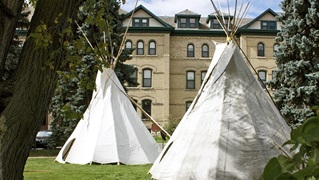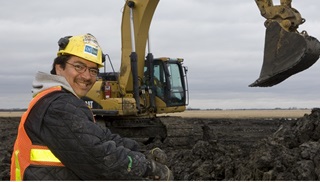Prosperity, self-sufficiency and the ripple effect
L3RP Aboriginal Training Program launches in Saskatchewan
Bill Crowe has seen the ripple effect firsthand.
Crowe moved from Ontario to the Canadian prairies at 17, starting work as an oilfield laborer. In the ensuing decades, he’s risen his way through the industry, built a broad range of contacts, and hired a good many Aboriginal workers for pipeline-based construction and civil earthworks projects.
Crowe not only knows the business value of hiring from Canada’s fastest-growing population. He’s also seen the positive repercussions created within those Aboriginal communities.
“When I was working for Carson Energy Services years ago, I started their Aboriginal engagement program in Western Canada. In one community, we went from 80 percent to 20 percent unemployment in two years,” says Crowe. “A lot of these kids still keep in touch today. Of course, they’re not kids anymore—they’re project foremen, and what-not. But they stay in close contact.
“I’ve seen it firsthand in one small community after another,” he adds. “When one person gets skills training in the field, and then finds regular employment, it convinces their friends and family it can be done, and it takes off from there.”
Crowe, a longtime First Nations contractor who’s now doing consulting work for Enbridge, has been instrumental in helping to develop a new Enbridge pilot project – the Line 3 Replacement Program Aboriginal Training Program, which was launched today in two Saskatchewan communities.
One training course, Pipelines 101, is being held for 16 consecutive days on the Whitecap Dakota First Nation, near Saskatoon, in partnership with the Saskatchewan Indian Institute of Technology, Strive Energy, and Saskatchewan Polytechnic. The other course, for heavy equipment operators and apprentices, is being led by the Saskatoon chapter of the International Union of Operating Engineers (IUOE) near Hanley, SK, and will entail as much as four weeks of training and education.
The first phase of the L3RP Aboriginal Training Program, with two Pipeline 101 sessions and one heavy equipment operator session, aims to graduate about 60 Aboriginal workers by Christmas—propelling them toward future employment in the pipeline industry, and related sectors, with demand for their skills.
The largest project in Enbridge history, the Line 3 Replacement Program will present economic opportunities in communities across the prairies as we replace one of our mainline right-of-way crude oil pipelines from Hardisty, Alberta to Superior, Wisconsin. All segments of the line between Hardisty and Superior will be replaced with new pipe, using the latest available high-strength steel and coating technology.
The Pipelines 101 course will be led by Crowe and Al Sawatzky, an Edmonton-based senior manager of pipeline construction with Enbridge, and include elements such as ATV operation, field survey work, chain-saw safety, and fire-extinguisher training.
“In addition to safety-ticket training, the Pipeline 101 course covers all the requirements for working on a pipeline right-of-way—the basic knowledge and training needed to sustain employment,” says Sawatzky.
The IUOE-led course, for students with previous skills training, will certify its graduates for work as heavy equipment operators or apprentices.
“I want to see these students employed—with Enbridge, or any other employer out there,” says Crowe. “Enbridge has been very supportive of this project, and is making Aboriginal economic participation a priority.”










